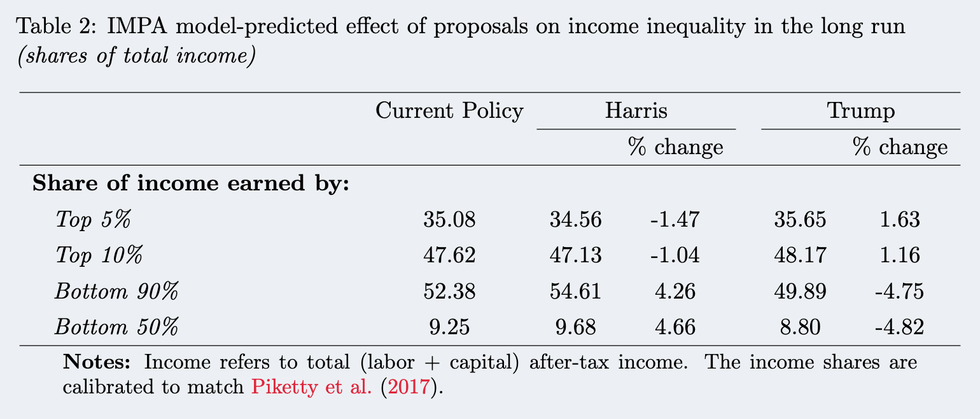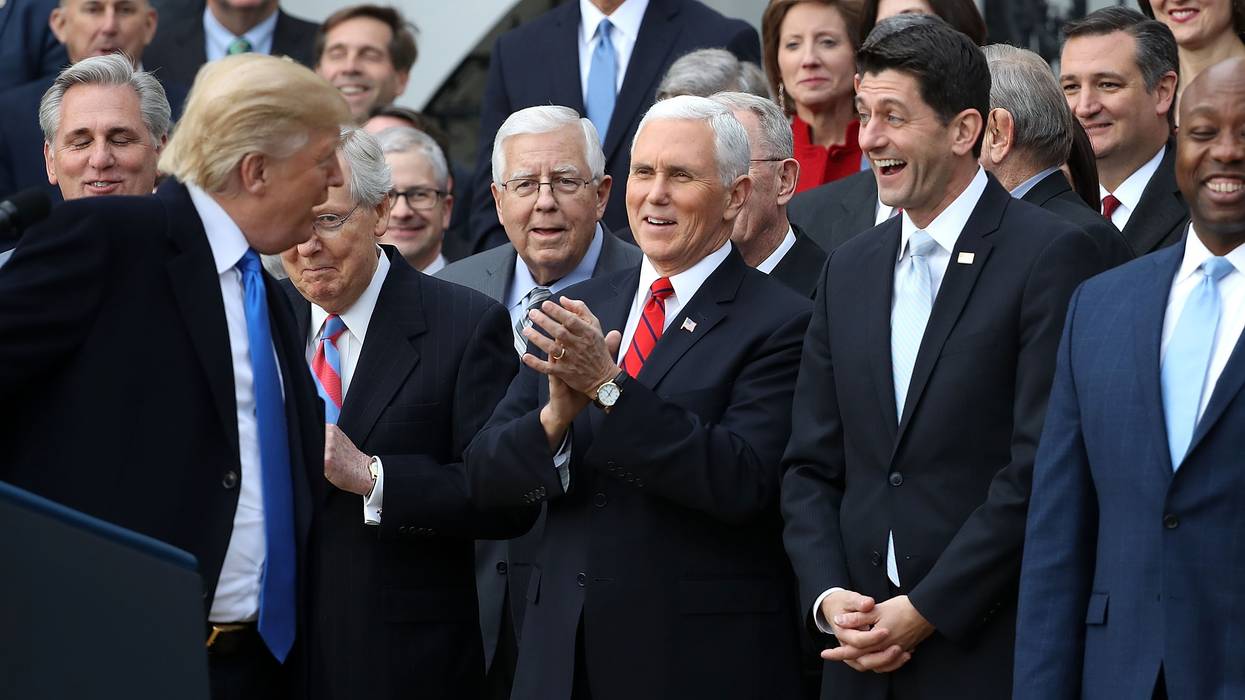The Washington Post reported Monday that "Republicans in Congress are preparing to not just extend former President Donald Trump's 2017 tax cuts if they win control of Washington in November's elections, but also lower rates even more for corporations."
"Now GOP lawmakers and some of Trump's economic advisers are considering more corporate tax breaks—which could expand the national debt by roughly $1 trillion over the next decade, according to researchers at Stanford University and MIT," the Post added.
The report on Republicans' plans comes a month after the Congressional Budget Office estimated that extending provisions of the 2017 tax cut law that are set to expire next year would add $4.6 trillion to the U.S. deficit.
"GOP is salivating at more handout tax cuts to their corporate bosses and billionaires that will balloon the debt," Rep. Chris Deluzio (D-Pa.) wrote on social media Monday. "Fiscal irresponsibility by the guys bought and paid for by huge corporations."
During his 2020 campaign against Trump, President Joe Biden pledged to "get rid of the bulk of" the 2017 Tax Cuts and Jobs Act (TCJA), but he and his party have thus far failed to do so.
Slashing corporate taxes even further than the 2017 law—which cut the business rate from 35% to 21%—would reward many of the same corporations that have pushed up prices for consumers in recent years in a shameless attempt to pad their bottom lines. A recent analysis by the Groundwork Collaborative found that between April and September of last year, corporate profits drove more than half of U.S. inflation.
"Big corporations raised prices higher and faster than inflation, squeezing working families to rake in record profits," Rep. Bonnie Watson Coleman (D-N.J.) wrote on social media in response to the Post's reporting. "So what's the GOP's plan? Even more corporate tax cuts and another $1 trillion to the debt. You can't make this stuff up."
Sen. Elizabeth Warren (D-Mass.) similarly criticized the GOP's plan to reward the corporations that have pushed costs onto consumers to boost their profit margins.
"The same corporations that have been price-gouging the American consumer at the grocery store, at the gas pump, and everywhere else are now spending their money loading up these Republican political action committees with the plan that the Republicans will deliver even more tax cuts," Warren told the Post on Monday. "It's obscene."
"Wealthy shareholders and executives got windfalls, workers got nothing."
Many of the country's largest, most profitable corporations already pay a tax rate that's significantly lower than the current statutory rate of 21%—if they pay any federal taxes at all.
A recent analysis by the Institute on Taxation and Economic Policy (ITEP) found that the nearly 300 companies in the Fortune 500 and S&P 500 that were consistently profitable between 2013 and 2021 saw their average effective tax rate fall from 22% to 12.8% under the Trump tax law, even as their bottom lines grew.
"The number of these corporations paying tax rates of less than 10% increased from 56 to 95 after the Trump tax law went into effect," ITEP observed.
Chuck Marr, vice president of federal tax policy at the Center on Budget and Policy Priorities, wrote in response to the Post story that "the 2017 tax law's centerpiece cut in the corporate tax rate from 35% to 21% was a complete policy failure."
"Wealthy shareholders and executives got windfalls, workers got nothing," Marr wrote, pointing to research showing that "workers below the 90th percentile of their firm's income scale—a group whose incomes were below roughly $114,000 in 2016—saw 'no change in earnings' from the rate cut" while executives saw a major boost.
Trump, who was convicted last month on 34 felony charges stemming from the falsification of business records, has not been shy about his intention to protect the wealthy and large corporations from paying their fair share in taxes.
Speaking to his rich donors at the home of billionaire hedge fund investor John Paulson in April, the former president emphasized that he would make "extending the Trump tax cuts" a top priority should he defeat Biden in November.
Andrew Bates, the Biden White House's senior deputy press secretary, noted in a memo released Monday that while Trump and his Republican allies "go to bat for the multinational corporations engaged in price gouging, they plan to slash Medicare and Social Security."
"Today's Washington Post story makes it impossible to ignore the enormous contrast between President Biden's agenda to rebuild the middle class and MAGAnomics," Bates wrote. "Republican officials who back MAGAnomics stand up for price gouging, tax giveaways for the rich, and across-the-board tariffs that would all raise prices, and they'd sell the middle class out with a skyrocketing deficit and cuts to Medicare and Social Security."





